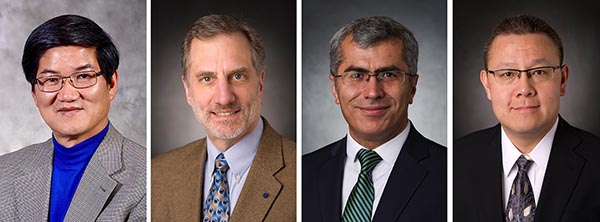
From left to right: Long-Qing Chen, Hamer Professor of Materials Science and Engineering, professor of engineering science and mechanics and professor of mathematics; Bruce Logan, Kappe Professor of Environmental Engineering and Evan Pugh University Professor in Engineering; Şahin K. Özdemir, associate professor of engineering science and mechanics; and Donghai Wang, professor of mechanical engineering and chemical engineering. IMAGE: PENN STATE COLLEGE OF ENGINEERING
Four College of Engineering faculty named to Highly Cited Researchers list
11/18/2021
UNIVERSITY PARK, Pa. — For the third consecutive year, four faculty members in Penn State’s College of Engineering were recognized as Highly Cited Researchers by the Web of Science Group: Long-Qing Chen, Hamer Professor of Materials Science and Engineering, professor of engineering science and mechanics and professor of mathematics; Bruce Logan, Kappe Professor of Environmental Engineering and Evan Pugh University Professor in Engineering; Şahin K. Özdemir, associate professor of engineering science and mechanics; and Donghai Wang, professor of mechanical engineering and chemical engineering.
The list is released annually to identify researchers who have demonstrated significant influence among their peers during the last decade.
Each year, more than 6,000 researchers around the world in 21 fields of the sciences and social sciences were selected based on the number of highly cited papers they produced over the last decade. A paper is considered highly cited if it ranks among the top 1% by citations for field and publication year.
Chen was named to the list in the cross-field category, introduced by the Web of Science Group in 2018 to identify researchers who have contributed highly cited papers across several different fields. This is his fourth consecutive year receiving this designation. A faculty member at Penn State for more than 20 years, Chen works to understand, predict and design materials microstructures, with a focus on their properties and evolution during the processing of materials. Chen is currently working to develop and implement computational models for multifunctional microstructures, lithium-ion batteries, two-dimensional materials, additive manufacturing of metallic alloys, polymer composites and quantum materials.
Logan was recognized for his contributions in the environmental and ecological category, the eighth consecutive year he was named to the list. A Penn State faculty member since 1997, Logan’s research primarily focuses on developing new renewable energy technologies, such as the microbial fuel cell, to achieve an energy sustainable water infrastructure. Last year, his team developed a new way to split sea water into renewable hydrogen fuel.
Özdemir was named to the list for his highly cited publications in the physics category for the third consecutive year. His research focuses on optical physics and quantum photonics, which is the broad study of how photons behave and interact, as well as the application of this understanding to new technologies. Özdemir is currently working to harness spectral degeneracies known as exceptional points that arise in non-Hermitian physical systems, which exchange energy and information with their surroundings, for developing novel optical techniques and micro/nano-photonic systems that would lead to fundamental scientific and technological advances in controlling the generation and transmission of light and its interaction with matter both in the classical and quantum regimes.
Wang, named to the list in the cross-field category, leads the Energy Nanostructure Laboratory (E-Nano) and develops advanced nanomaterials for energy storage technologies, such as silicon-based anodes and lithium metal anodes in rechargeable lithium ion batteries, lithium-silicon batteries and solid state batteries. A Penn State faculty member since 2009, Wang has received the Highly Cited Researcher designation for four consecutive years.
The Web of Science Group, part of Clarivate Analytics, is an information and technology provider for the scientific research community. The company organizes the world’s research information to help enable academia, corporations, publishers and governments to accelerate the pace of research.

